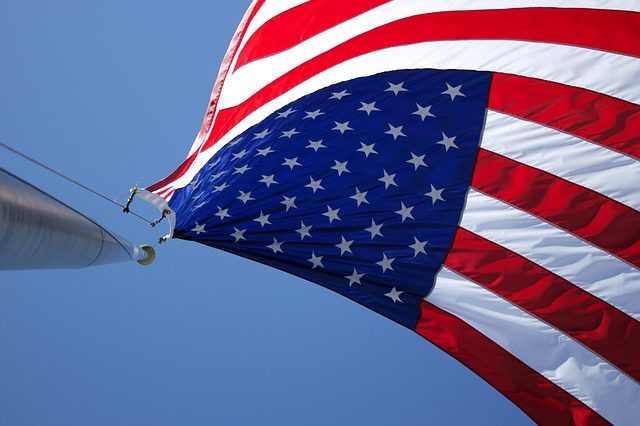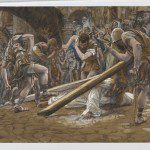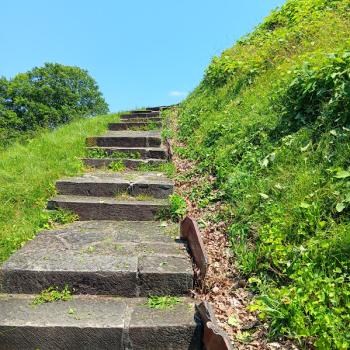
When I was a little girl I had a picture book of odd children’s stories. One of them concerned a naughty mouse who ended up getting stuffed in a pasteboard box and thrown in the river to drown. The box dissolved as it sunk in the river, and the mouse was able to swim to safety at the last moment. He went back to the house he lived in, and reformed his life.
This summer, I feel like my entire country is dissolving like a cardboard box thrown into a river. Peaceful protests are still ongoing all over the country in massive numbers. The police are still attacking the protesters. Mysterious government thugs in riot gear are brutalizing people for show. People are being disappeared into vans. And then there’s that pandemic– dying down a bit on the coasts, rising up in the Midwest, surging like never before in the South. In my tiny Jefferson County, Ohio, we’ve had one more death and we add a few new cases every day. They say it’s going to be the hardest fall and winter of our lives.
Half the people in town are still acting like it’s a hoax.
California is burning as it does every year lately. And it’s hurricane season; there’s one on the East coast just now.
I wonder how much more we can take, before the sides of the box give way and the water rushes in.
I grew up thinking America was the best place in the world and that everybody liked us. That was a standard American thing to think, in the nineties and for about twenty months afterward. When I was exactly a month shy of my sixteenth birthday, I watched the Twin Towers dissolve into ash on live television. Nearly three thousand people were murdered over the course of two hours. We mourned for a month and then went to war with the wrong country–not Egypt or Saudi Arabia where the murderers had come from, but Iraq and Afghanistan. We are still there. And that was how we learned that we hadn’t been quite right. It wasn’t true that America was the best place in the world and everybody liked us. We decided it was the best place in the world, and some people hated us because of our “freedom.”
As I grew older, I began to understand differently yet again.
I was poor for a time, and discovered how thin the membrane on the American Dream really is– how perfectly easily one can fall through the cracks and be destroyed, and how little of a safety net there’s ever been. Our democracy isn’t all that remarkable either; other places do much better. Other places, people can afford to go to the doctor and to school, and to take vacations, and they have quite a bit more say in what their country does. The police don’t murder some people and beat up others. We’re not exceptional. We’re not even mediocre.
If America is a cardboard box thrown into the river, it’s a thin one. Not a box for mailing packages, but a cereal box.
Do I love my country? Oh yes. I love the Appalachian mountains where everything is alive, and the beaches at Pawley’s Island where I learned about receiving the Kingdom like a child. I love the mysterious people I’ve met whose stories are so tragic but they keep on fighting. I love the heroes and saints from our history: Harriet Tubman, Martin Luther King, Dorothy Day, Nick Black Elk. I love us. I love Americans.
I am not in love with our stab at democracy and what it’s turned into lately.
I’m not in love with what we’ve done to people and how callous we’ve been.
I downright hate what we’ve done to the environment.
I am certainly not at all fond of our response to infectious disease, lately. I’m not happy that we’ve lost over a hundred fifty thousand people, fifty times the nine/eleven death rate, a thousand more dying every day. And it’s going to get worse.
I am not happy to be in this particular box just now, as the river flushes it away downstream and the glue gets softer and softer at the corners. Eventually the water’s going to come rushing in.
What now?
I can’t swim to the surface and get to safety like the naughty mouse in my storybook. The borders are closed. Nobody’s letting Americans out of America. I don’t even have a car to drive to a big city and take part in a protest.There is no shore to the river, not right now. Nothing to do but sit here and write about it as it drags me downstream to drown.
People keep telling me to channel my anger into voting and I’m going to, certainly. I’m going to vote come November. And if I get my way, I think it will make things easier in several ways. But it’s not going to fix this.
Earlier this summer, on a sweltering day, I went to visit the Friendship Room. I didn’t want to violate social distancing– I have fibromyalgia, Michael has asthma and I’ve got a small child at home. None of us would fare well if I brought back Covid-19. But I wanted to say hello to Molly from the sidewalk as she worked on the porch. I wanted a chance to feed the Friendship Room’s free pantry. I packed a bag of canned tuna and a few packages of electrolytes, and I took the bus downtown– masked, hands on my lap instead of on my armrest, bottle of hand sanitizer convenient in my purse. This is how I’ve been traveling on necessary errands since March.
I got off well before my planned stop, when I saw the protesters at the courthouse.
There was a tiny group of men, women and children: it seemed to be either a large family or a small church congregation. The children carried homemade posterboard signs in bright orange and pink. They were all carefully masked, except for the one holding a bullhorn; his mask was down around his neck. “I just want you to let me know I matter!” Said the man into his bullhorn. “Honk if I matter! Honk for me if Black lives matter!”
And some of the cars at the intersection gave him a honk, and the children waved their homemade signs and cheered.
I wanted to support them. I wanted to do something to help, however futile, just so I could say that I did something to help those speaking out for justice while my country dissolved around me, but I didn’t know how. The heat had started torturing my fibromyalgia the moment I got off the bus, and I couldn’t stand in a crowd for fear of bringing the virus home.
I ran into the Dollar Tree nearby, and I bought the smallest case of bottled water. It was all I could carry along with my bag for the Friendship Room.
I stumbled with it across the street to the tiny protest in front of the courthouse.
“Hello,” I said. “I can’t stay and protest with you because I’m high risk. But I brought you something to drink. Thank you so much for being here!”
“Thank you very much, Ma’am,” said one of the protesters, a pair of dark brown eyes over a black silk mask. He actually seemed to mean it.
He held out his bare hand to me.
I shook it, the first time I’d touched anyone outside my family since March.
If a country which was never really good, but which I love for many good reasons, falls to pieces and drowns me with it, will any of this make any difference? That there was a free pantry downtown, where hungry people could get something to cook for dinner, and everyone in town helped stock it? That I went downtown to bring a can of tuna to the free pantry and say “hello” to somebody I love and admire, who was working down town during a national emergency so the hungry wouldn’t go without? That I got off the bus at the wrong stop because I saw children waving brightly colored posterboard in front of the courthouse to make somebody say that their lives had value? That a man begged a crowd of idling cars to make a noise and tell him that his life mattered, and somebody honked a horn at him? That I paid one dollar for cheap plastic bottles of filtered tap water at a chain store?
That in a middle of a pandemic, when they were masked so they wouldn’t even recognize each other if they ever met again, two strangers shook hands and made eye contact, and said “thank you” to each other?
Or maybe that’s all that has ever made a difference: not countries or nations or other great big things. But people doing what little they could, with what little time they had, before the walls of that flimsy box collapsed and it was over.
Sharing water with one another, as the water rushes in.
Image via Pixabay
Mary Pezzulo is the author of Meditations on the Way of the Cross.
Steel Magnificat operates almost entirely on tips. To tip the author, visit our donate page.













